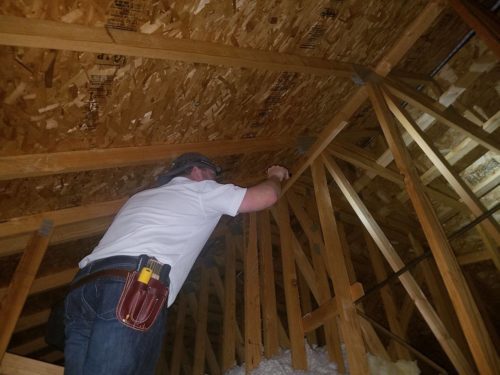Congratulations! You must be in the market for a new home–what an exciting time for you and your family! Right now we have the lowest inventory nationwide in 30 years, and interest rates are on the rise. That means it is a very competitive sellers’ market, and sometimes multiple offers will come in on the same house. I’ve been a realtor for 12 years and would like to share some tips to help you secure your slice of the American dream.
10. Make a plan
It doesn’t have to be elaborate, but having a plan can help you be ready to act when you find a house. In your plan you should include things like:
- What is our timeline to make a move?
- What is our budget?
- How much can we put down?
- If in a lease, have you talked to your landlord?
- If I have a house to sell, what needs done to get it market ready?
- How serious are we?
9. Get pre-approved
More than ever, sellers want to see that a buyer is ready, willing, and able to buy when they write the offer. Most banks are happy to discuss all their loan products openly before running your credit. Don’t shop too many banks; most of them require a “hard pull” on your credit to determine creditworthiness and pre-approval status. Veterans, make sure to check out the VA home loan option on your personal residence. They have very reasonable rates and up to 100% financing.
8. Find a Realtor
As a buyer you should always contact a realtor–they know the market and have access to what you want and need. Looking online and vetting properties every night before bed is fine, but when you are ready to buy or look, your realtor will be able to show you properties and assist you in making an offer.
Myth: You have to pay a commission when you buy.
Truth: 99% of the time the buyer doesn’t pay a commission; realtors are paid by the sellers.

7. Needs vs. Wants
There are many variables that you should hone in on to narrow your search results. Focus first on what you “have to have” in your home; then you can make a list of “nice to have.” Think of your “have to have” items as those you won’t budge on in your search. Some examples of things I’ve seen impact people’s selection include:
- How many bedrooms do you need?
- What school district(s) do you prefer?
- Do you have pets you need to accommodate?
- Finished or unfinished basement?
- How many car garage stalls do you need?
- Are you looking to live in a specific area or neighborhood?
- Will you be commuting to work? How far are you willing to drive?
6. Budget
How much are you comfortable spending? This will most always be determined by your pre-approval status with your lender. At the end of the day, only you know what makes sense for you, your budget, and your risk level. One of the hardest things about this process is to keep your emotions out of it. Nothing hurts more when you lose the offer on the house you want. Emotional ties to real estate can affect proper negotiations. Any house will sell in any market. . . for the right price, which is simply what someone is willing to pay for it. If you can’t afford to go over your budget, DON’T.
Rule of thumb: Every $10,000 in price adds or subtracts roughly $50 per month in your mortgage. Stay below 33% of your monthly income on housing. If you have specific questions, talk to your realtor or your lender.
5. When you know, ACT!
Some people will tell you they knew right away when they walked in their house they had to have it. Others will tell you they had a feeling or a dream about it. Others buy because the house meets their needs. When you decide that house beats the others you have seen or it was everything you wanted and more, don’t hesitate get your offer in! You have no idea who else is ready to put an offer in on it.
Remember you can always add value, paint a wall, add a bathroom, change an appliance, make updates, etc. Look past small hang ups and focus on the “bones” of the property.
4. Get a Home Inspection
Because there can be many unknowns when buying a new home, it’s smart to reduce your risk and spend money up front for a home inspection. Home inspections are meant to find problems related to the mechanical, structural, safety, and health hazards associated with a property. Any items in those categories are negotiable with a seller. A good inspector will also point out plenty of “recommended” items to be fixed or replaced that fall outside of those categories.

3. Don’t sweat the small stuff
There are “things” that come up all the time in real estate. Every deal is different, and most of the time the buyers and sellers have no idea what may come up. Your realtor’s job is to handle all the back and forth to ensure the process of getting you to the closing table is simple and low stress. However, if they make you aware of any issues, relax–most of them are fairly easy to resolve.
2. Close and move
Once you have an accepted offer, the excitement tends to plateau. Therefore, patience here is crucial. There are many moving parts–everyone is working on paperwork while you are packing your home and preparing for the move. It can be a pain, but the joy of staying the first night in your new house makes it all worth it! Closing for the buyer takes about an hour. Most of your time is spent signing your mortgage documents. After the closing disclosure, transfer of the deed, and checks passed back and forth, the sellers are done and the rest is you and your lender. Schedule a time that works for you when picking your closing time. I always recommend closing on a Thursday; Fridays are really popular, so you may not get the time slot you want with your lender.
1. Lean on others’ expertise
There are so many things to know about buying a home that you could spend a lot of time and money to get a degree in understanding real estate. However, your realtor has already been through all of that! Ask questions. Ask more questions. Every house is different, and every deal is unique. Websites like Zillow and Realtor.com can help you to “shop,” but the downfall is you may miss the boat when you are ready to see that house and write an offer. That’s why working with an agent is imperative; they can inform you if there are offers on the table or an offer has already been accepted. There are plenty of people to help you in this process, but you have to ask for help, communicate, call, meet, and walk through properties.
The most important thing you can do once you’ve signed on the dotted line and moved in, is to celebrate your new home! Too often we are consumed by constant busyness and forget to pay homage to the awesome new life event, and before you know it, it is over and too far in the rear view. Stop and enjoy this milestone for you and your family. I feel so lucky to help people find the perfect place for them to create memories of making their house a home.

About Guest Blogger:
Tom Webber is our guest contributor and husband to ICMB writer, Mandy Webber.
5 months ago, Tom’s world was changed as he became “Daddy” to his daughter, Brooke Lynn. “My wife is my new hero!” he says, reflecting on her courage and tenacity during pregnancy and labor. No stranger to a nesting to-do list, Tom understands the maternal instincts of a mother in preparing the home for the big arrival of a new family member.
Tom is a licensed Real Estate Broker with Mottinger Real Estate Group & Legacy GreenBuilders. He has been in the business for twelve years and has been licensed in four different states. His experience and background knowledge in property management, appraisals, residential investments, commercial retail leasing and development, multi-family development, and residential and commercial sales gives him a well-rounded perspective when assisting his clients in finding potential properties.
This is a sponsored post. ICMB was compensated for sharing this piece. However, we love connecting our readers with people and organizations that are doing good in our community, and we think you will find this information helpful and informative!












Check color shade in a light box & match with Buyer approval Lab dips. Fabric weight checked randomly from each roll & maintain the record. website: http://www.buyinghousewall.com/
Thank you for sharing your tips on buying real estate. It’s interesting to learn that most of the time, buyers don’t pay a commission to realtors. I didn’t know that the realtors are paid by the sellers. I like how realtors assist the buyer from choosing from listings to the paperwork involved. I imagine having the help of an experienced realtor will make the whole experience a smooth and pleasurable one, especially to first-time buyers like me.
Thank you so much for the tips on buying a home. My husband and I have been wanting to buy a home, but we didn’t know how to start. We didn’t think about getting pre-approved before we started to look around.
I think that what you had to say here about making a plan when it comes to real estate was really smart. My wife and I are planning on buying a home, but we have yet to think about what our timeline is or even what our budget limits are. With that being said, once we think about these things, it should make the plan of action much easier for us. Thanks for the post, and we will make sure to become pre-approved to make the process go even smoother.
I like that you suggested having a realtor help you because they have more knowledge about the market. I have been thinking about buying property and I’m not sure how to start. I can see how it would be nice to have help from a realtor because they could keep me from making any legal mistakes.
Thanks for suggesting that we have a home inspection occur when we find a real estate property that we like so that we can be sure to know about any hazards before we buy it. My husband and I are in need of a new home, so we are wondering how to go about it. We will be sure to have any real estate properties we like to be inspected so that we can negotiate our price as well.